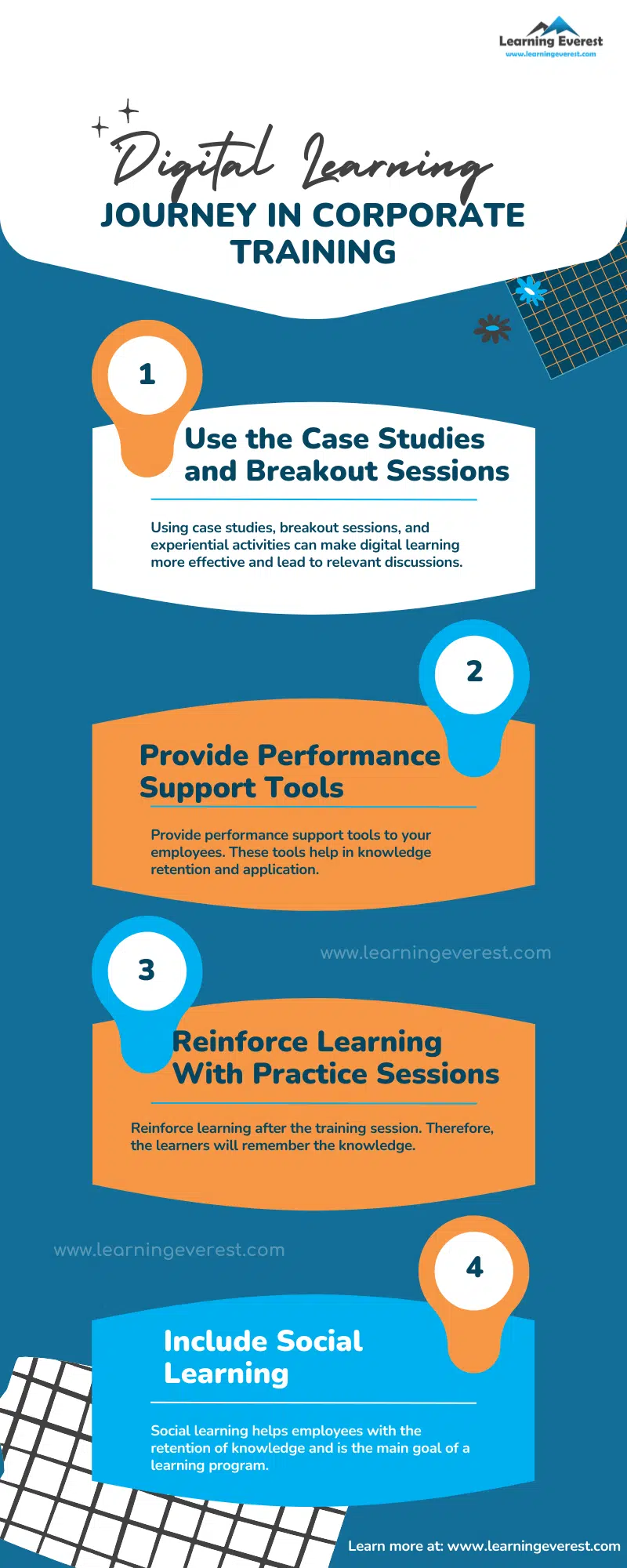Digital learning journeys are essential in achieving the learning objectives and training outcomes for the workforce. Many organizations prefer moving their classroom training sessions to online virtual learning journeys for greater accessibility. Instructors are now using virtual tools to conduct the sessions.
Table of Contents
- What is a digital learning journey?
- Framing the digital learning journey
- Making Your Organization Ready for the Digital Learning
- The Path of A Digital Learning Journey
- Learning Journeys and Online Corporate Training Programs
- Why Digital Learning Journeys?
- Creating successful learning journeys
- Creating a learning strategy
- Strategies to Create Digital Learning Journeys
- Final Thoughts
- Infographics
- Knowledge Check!
- Frequently Asked Questions (FAQs)
- What is a digital learning strategy?
- What are the benefits of digital learning?
- How can digital learning be effective?
What is a digital learning journey?
Digital Learning is any training enhanced with the use of technology. It is also called eLearning, e-learning, online learning, and technology-enhanced learning.

What is a digital learning journey-
Digital learning includes:
- Blended learning
- Mobile learning
- Augmented and virtual reality learning
- Webinars
- Video-based learning
- Micro-learning
- Interactive online content
- Massive Open Online Courses
Before starting the digital journey at your organization, ensure that the journey would support your business strategy. Analyze the requirements, vision, and goals of your organization. Thus, you can plan a learning solution that will help your business.
Framing the digital learning journey
Asking yourself the following questions will help you frame the digital learning journey:
- What do you want to accomplish as an organization?
- What is success for your organization?
- What can help you achieve your goals?
- How will digital learning fit into your organization’s culture?
- How can employees incorporate digital learning?
- What technologies will meet your requirements?
Digital learning journeys can be customized according to the needs of your organization. L&D professionals can achieve the organization’s training goals by creating engaging digital learning journeys. They can provide learning that helps employees bring about behavioral change in the workforce.
Making Your Organization Ready for the Digital Learning
Corporate training leaders must ask themselves what the goals of the training programs are and how the impact of learning will be measured.
Ensure that the learning goals are aligned to the corporate performance measures. It would help if you had active participation and backing from the C-suite. Without that, any efforts regarding your corporate learning programs can fail. Also, admit when the strategy needs to change. Take time and thoughtfully consider how to change it.

Making Your Organization Ready for the Digital Learning
The Path of A Digital Learning Journey
Training to be successful requires a process in which each step is carefully taken and contributes to the results. The training program must be designed as a complete system. It has to be supported by those in direct contact with the learner. The training program must have quality content.
Learning Journeys and Online Corporate Training Programs
With the shift towards remote-first approach in the corporates, L&D teams have been combating many obstacles, one after the other, to ensure that the employees remain motivated at work. Remote working is here for a long time ahead and will consistently impact corporate learning culture. Organizations, therefore, need to have digital learning journeys for practical online corporate training.

Learning Journeys and Online Corporate Training Programs
Why Digital Learning Journeys?
Online learning provides many benefits. These benefits include:
- Scalability: L&D professionals now adopt scalable training solutions for employee engagement, skill acquisition, and business growth. eLearning is a scalable approach because you can deliver online courses to a large group of learners more effectively and faster than ever.
- Personalization: Every learner has a different training style. Online training makes it possible to meet personalized learning goals. Learners can choose their learning paths and navigate their digital journeys based on convenience.
- Cost-effective: Digital learning journeys enable people to access relevant training material anytime, anywhere, and on any mobile device. It is a cost-effective approach.
Creating successful learning journeys
Discuss with your team and colleagues at other companies who use the same program to learn. Understand what has been working for them. Thus, you get a standard or best practice to start. Start simple. Don’t have too much content.

Creating successful learning journeys
Creating a learning strategy
So how can you create a learning strategy that is well-aligned with your organization’s goals?
- Ensure that you involve corporate leaders while making decisions.
- Analyze strategic business goals
- Identify measurements of success.
- Determine learning activities.
- Focus on the final results.
Strategies to Create Digital Learning Journeys
The following are four strategies to help you create effective virtual learning journeys for your employees.
- Use the Case Studies and Breakout Sessions: Using case studies, breakout sessions, and experiential activities can make digital learning more effective and lead to relevant discussions. These methodologies will help the learners to be engaged in virtual learning.
Breakout rooms help formulate ideas and thus allow creativity and application of what is learned in the session. Breakout rooms allow discussion and collaboration among the learners. This approach is applicable for live online sessions.
Case studies are helpful to teach strategies and ideas. They are information-providing tools and can be used for comprehension activities. They can help learners improve their analytical and problem-solving skills. Case studies enable facilitators to demonstrate actual incidents/events that showcase crucial lessons and best practices. This approach can be made use in both live online learning mode and in eLearning mode. - Provide Performance Support Tools: Provide performance support tools to your employees. These tools help in knowledge retention and application. Facilitators or the Subject Matter Experts can use learning aids to make a great learning experience.
Some popular learning aids are:
– Infographics
– Videos
– Interactive PDFs
– FAQ documents
– Checklists - Reinforce Learning With Practice Sessions: Reinforce learning after the training session. Therefore, the learners will remember the knowledge. Have frequent collaborations with learners. You can do this through learning solutions. With the latest technologies like artificial intelligence, you can provide content created, based on the learner’s needs and the nature of their job role.
- Include Social Learning: </strong>
Social learning helps employees with the retention of knowledge and is the main goal of a learning program. They can learn from peers, senior employees, and experts within their organization.
Final Thoughts
Digital learning offered by your organization must be well-planned, designed, and delivered. Its design must be so that it helps the learner close all skill gaps that prevent them from performing at their best in work. Ensure your organization’s digital learning strategy is aligned with business goals.
The nature of work is evolving every day. Therefore, there is a need for continuous learning. Organizations must ensure that their employees take responsibility for their knowledge. Providing relevant learning experiences and opportunities to practice and offering support that is aligned to the strategic requirements of the organization is critical.
Having a clear understanding of what is essential for your organization helps you implement a successful learning strategy. Now that, you are about to start the digital learning journey of your organization. Where should you begin? Be aware of what is available and talk to some experts to get an idea of the best approach for your organization.
Infographics
Knowledge Check!
Frequently Asked Questions (FAQs)
What is a digital learning strategy?
A digital learning strategy shapes the way an organization uses digital learning in all its forms. This can include blogs, videos, webinars and online collaboration.
What are the benefits of digital learning?
The benefits of Digital Learning include:
- Personalized Learning
- More Information
- Engaging Lessons
- Develops Accountability
- Flexibility in Learning
- Access content anytime
How can digital learning be effective?
The following steps can be taken to make a digital learning journey effective:
- Have clear goals
- Check all technical requirements
- Have a stable internet connection
- Choose a study area
- Be organized
- Take breaks and reward yourself
- Participate in online discussions






